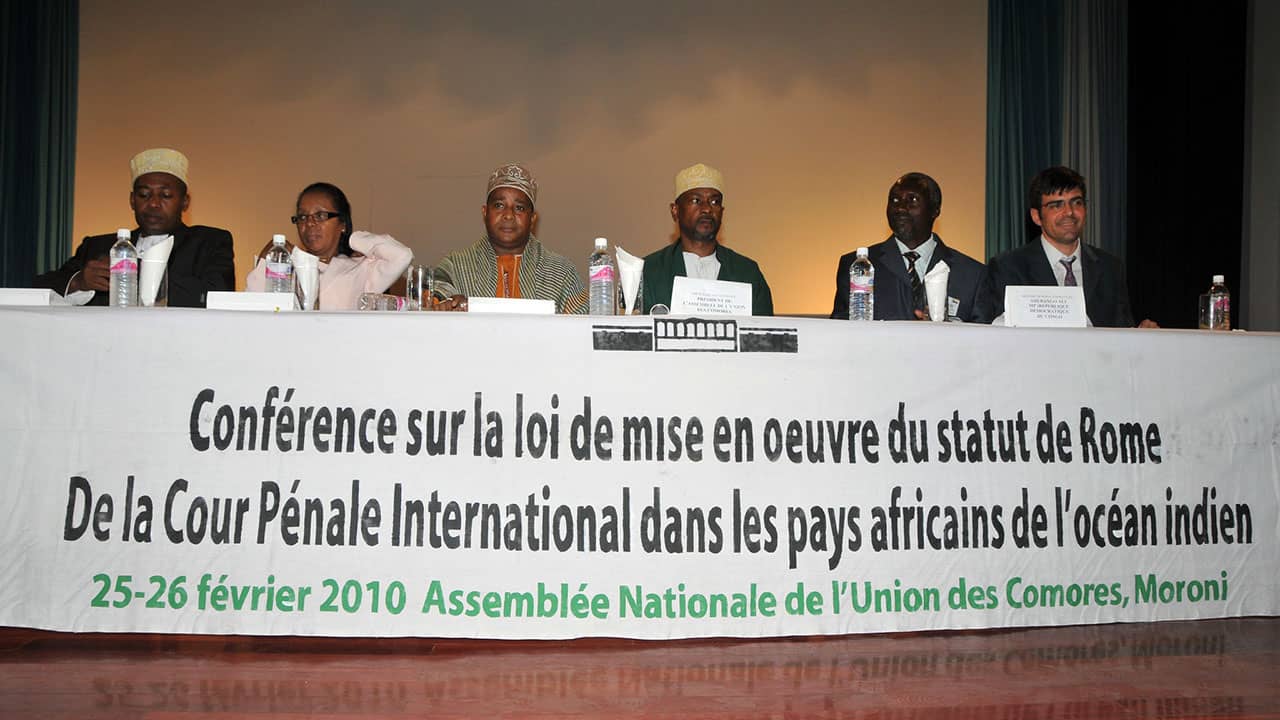Since 2002, PGA has been working in Comoros with a multiparty group, promoting the fight against impunity notably through the ratification and domestic implementation of the Rome Statute of the International Criminal Court (ICC). To this effect, PGA provided technical assistance and support to its PGA Members, whose efforts led to the adoption of an ICC cooperation bill in 2007. PGA kept providing input and assistance to its National Group to encourage the process of revisions of this bill in order to integrate provisions of the Rome Statute as well. This support led to the adoption by the Assembly of Comoros of a comprehensive implementing legislation of the Rome of the Statute on 13 December 2011. In other to make the principle of complementarity fully operative and to ensure the full cooperation of Comoros with the ICC, PGA’s priority in Comoros is now the ratification of the Agreement of Privileges and Immunities of the ICC.
Rome Statute:
Comoros, a signatory of the Rome Statute, deposited at the UN its instrument of ratification of the Rome Statute on 18 August 2006, as a result of PGA Members in the Parliament of Comoros.
Kampala Amendments of 2010:
Comoros has not yet ratified the Amendments to the Rome Statute adopted by the 2010 Review Conference (Kampala Amendments) on the crime of aggression and on the use of certain weapons in armed conflict not of an international character.
Agreement and Privileges and Immunities of the Court (APIC):
Comoros has yet to accede to the APIC.
Additional Agreements:
Comoros has not signed additional agreements of cooperation with the International Criminal Court.
Domestic Implementation of the Rome Statute Status:
Following extensive efforts of PGA Members in the Parliament of Comoros the legislation n.11-022/AU implementing the Rome Statute, covering both cooperation and complementarity provisions, was adopted in the Parliament on 13 December 2011.
Description of the ICC process and of PGA’s involvement:
Under the leadership of PGA members, Mr. Assoumani Mondoha and Hon. Hamidou Bourhane (now Speaker of the Assembly), the Comoros ratified the Rome Statute and enacted legislation on cooperation on 7 February 2007 (Decree No. 07-013/PR promulgating Law No. 07-002/AU on Cooperation with the International Criminal Court). However, substantive provisions, particularly the definitions of crimes, were missing. Therefore, with the support of PGA, a new draft law, which was the outcome of civil society-government consultations held in September 2008 aimed at amending the Decree 07-013 in order to fully implement the principle of complementarity. PGA delivered technical assistance, upon request of Comorian Legislators, to ameliorate the draft legislation on complementarity, specifically to eliminate the penalty of “corporal punishement” (included by the Government in an initial draft). The amended bill remained without treatment in parliament for more than a year until February 2010 when PGA organised an ad hoc subregional event in the Parliament of Comoros in Moroni to create a momentum for prompt adoption and to discuss the need to protect the integrity of the Rome Statute. Subsequently, on 13 December 2011, the legislation n.11-022/AU implementing the Rome Statute, covering both cooperation and complementarity, was adopted by Parliament. The legislation is considerably progressive and broader than the Rome Statute in significant aspects including the explict prohibition of amnesties, universal jurisdiction and superior orders (which, contrary to article 33 (2) of the RS, are considered as always manifestly unlawful, not only for crimes against humanity and genocide but also for war crimes). The Comorian Implementing Legislation also provides for the creation of a trust fund for victims, effective provisions on the protection of victims and witnesses, and on the freezing of assets. Former PGA Member, Mr. Assoumani Mondoha (currently Ambassador to the AU) played a crucial role in the Comorian law-making process by remaining engaged in transmitting PGA’s input on the draft bill and supporting the processs of adoption with his former colleagues in the Parliament of Comoros, along with the current Speaker of the Assembly and PGA Member Hon. Hamidou Bourhane.
Other Relevant Information:
Comoros parliamentary participation in PGA events
Comorian MPs participated in several sessions of PGA’s Consultative Assembly of Parliamentarians for the ICC and the Rule of Law: IV session in Tokyo (2006), V session in Santo Domingo (2008), VI session in Kampala (2010) and VII session in Rome (2012).
Universal Periodic Review - Human Rights Council
Comoros will be reviewed by the UPR during the 18th session in 2014. For PGA’s work through the UPR click here.
African, Caribbean and Pacific community
As a member of the African, Caribbean and Pacific community (ACP), and as signatory of the revised Cotonou Agreement with of the ACP and European Union, Comoros has recognized the importance of the ICC as a mechanism for peace and international justice, and has committed to promote the ratification and implementation of the Rome Statute, to seek to take steps towards the ratification and the implementation of the Rome Some Statute, and to fight against international crime giving due regard to the Rome Statute. For more information on the work of PGA within the ACP-EU mechanism. See PGA work through the ACP-EU Joint Parliamentary Assembly.
ICC Investigations:
On 14 May July 2012, the Elmadag Law Firm, acting on behalf of the Government of the Union of the Comoros, transmitted a referral of the Union of the Comoros to the Office of the Prosecutor of the ICC, regarding the 31 May 2010 Israeli raid on the Humanitarian AidFlotilla “Mavi Marmara” heading towards the Gaza Strip. The referral requested the Prosecutor of the ICC to initiate an investigation into the crimes committed within the jurisdiction of the Court during this raid pursuant to articles 12, 13 and 14 of the Rome Statute. The Office of the Prosecutor is thus currently conducting a preliminary examination to establish whether the criteria for opening an investigation are met.







